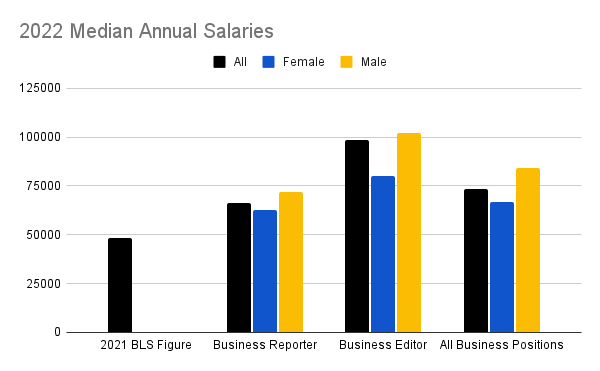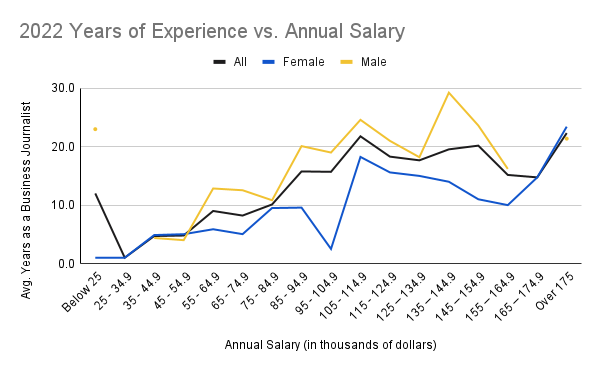Survey: US business journalists earn more than peers

Image by Gino Crescoli from Pixabay
Business journalists in the United States earn nearly $18,000, or 37%, more than their peers, according to a recent survey conducted by the Donald W. Reynolds National Center for Business Journalism.
The Reynolds Center has revived its annual salary survey of business journalists, last published in 2012, and expanded the survey this year to include demographic data. One of the long-term goals of the survey is to promote the appeal of a business journalism career among college and high school students to help diversify business news and better represent the communities it serves.
In general, news analysts, reporters and journalists earn $48,370 a year, according to the most recent median figures published by the U.S. Bureau of Labor Statistics. Of the 63.9% of business journalists surveyed who stated their position as reporter/correspondent, the median annual salary was $66,204 — well above the average journalist’s salary. In addition to boasting higher pay, business journalists reported specializing on a wide range of topics from common beats such as markets, real estate, restaurants and the local economy to lesser-known areas, such as state budgets, energy, sports, aerospace and even reporting on the cannabis industry.
“The news business has had a rough few decades, but business news is more important than ever and, in a world of supply chain disruptions and inflation, impacts all of us. We need smart, savvy business journalists to help us navigate this complex world,” said Jeffrey Timmermans, Donald W. Reynolds Endowed Chair in Business Journalism Professor of Practice and director of the Reynolds Center.

“What’s more, there are tons of great jobs in business journalism out there right now — and as our survey shows, they pay better than typical reporting jobs,” Timmermans said.
The Society for Advancing Business Editing and Writing (SABEW) provided key support for this survey by distributing it among its membership.
“SABEW is encouraged by the competitive salaries for business journalists who play an important role in providing comprehensive reporting of economic events,” said Kathleen Graham, SABEW’s executive director. “We are grateful to the Reynolds Center for benchmarking the industry salary and demographic data. The survey results reflect the continued need to mentor, recruit, retain and promote diversity in the newsroom and in business coverage. Closing the gender pay gap, increasing the number of journalists of color and fostering inclusive newsroom cultures remains a high priority for the largest association of business journalists.”
Over half of the survey respondents, 53%, identified as female, illustrating a strong representation of women in business journalism. Sadly, the median salary for female reporters/correspondents lagged behind males by $9,167, with women earning $62,498 compared with men’s $71,665. This wage gap persists in higher-level editing and managerial positions, with female editors or managers earning a median of $79,996 compared with men’s $101,997. A combined median income for editors and managers in business reporting was reported at $98,331. However, when comparing salary in relation to years of experience, women earned a higher salary in less time on the job, illustrating that the gender wage gap could narrow in the years to come.

“There’s been some improvement on the gender front, but there’s still a long way to go in narrowing the salary gap. Overall, the lack of diversity in business journalism continues to be a serious issue,” Timmermans said. “We need a corps of business journalists that truly reflects the community they serve — that’s essential to make business journalism relevant to the broadest possible audience.”
A total of 236 journalists from 36 states responded to the survey, which was conducted between May 13 and May 25. Just over half of the respondents reported from six states: New York (17.4%), California (8.5%), Florida (7.6%), Washington (7.2%), Texas (6.4%) and Michigan (4.7%).
Respondents ranged in age from 18–24 (9.8%), 25–34 (35.6%), 35–44 (19.5%), 45–54 (16.1%) and 55-plus (18.2%), with an average of 12.2 years working as a business journalist. The majority of the journalists (91.6%) stated that they worked for print/digital publications, while the rest worked for a wire service, television, radio or other media, including freelancers.
Survey respondents’ racial background was 80.8% white, 4.7% Black, 5.5% Asian/Pacific Islander and 4.7% multiracial.
The Reynolds Center reached out to business journalists throughout the country from large publications, including The Wall Street Journal, Reuters, New York Times and Bloomberg News, as well as smaller regional newspapers and media organizations, including each of the 42 publications of American City Business Journals. Additionally, the Reynolds Center collaborated with SABEW to invite their 2,500-plus members to participate.
The Donald W. Reynolds National Center for Business Journalism was established in 2003 with the goal of improving the quality of media coverage of business and the economy. The Reynolds Center is housed inside the Walter Cronkite School for Journalism and Mass Communication at Arizona State University.
For more information about the Reynolds Center’s salary survey, contact: reynoldscenter@gmail.com.
More Law, journalism and politics
Can elections results be counted quickly yet reliably?
Election results that are released as quickly as the public demands but are reliable enough to earn wide acceptance may not…
Spring break trip to Hawaiʻi provides insight into Indigenous law
A group of Arizona State University law students spent a week in Hawaiʻi for spring break. And while they did take in some of the…

LA journalists and officials gather to connect and salute fire coverage
Recognition of Los Angeles-area media coverage of the region’s January wildfires was the primary message as hundreds gathered at…

